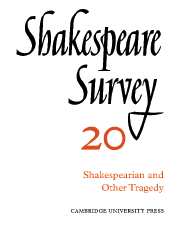Book contents
- Frontmatter
- Shakespeare, Fletcher and Baroque Tragedy
- Seneca and the Elizabethans: A Case-study in ‘Influence’
- George Chapman: Tragedy and the Providential View of History
- Critical Disagreement about Oedipus and Hamlet
- Shakespeare’s Thematic Modes of Speech: ‘Richard II’ to ‘Henry V’
- Anarchy and Order in ‘Richard III’ and ‘King John’
- The Staging of Parody and Parallels in ‘I Henry IV’
- Shakespeare’s Unnecessary Characters
- Walter Whiter’s Notes on Shakespeare
- Shakespeare’s ‘Romeo and Juliet’: Its Spanish Source
- The Grieves Shakespearian Scene Designs
- Shakespeare on the Modern Stage: Past Significance and Present Meaning
- Shakespeare in Brazil
- Recent Shakespeare Performances in Romania
- Shakespeare, the Twentieth Century and ‘Behaviourism’
- The Year's Contributions to Shakespearian Study 1 Critical Studies
- 2 Shakespeare’s Life, Times and Stage
- 3 Textual Studies
- Index
- Plate section
Shakespeare’s ‘Romeo and Juliet’: Its Spanish Source
Published online by Cambridge University Press: 28 March 2007
- Frontmatter
- Shakespeare, Fletcher and Baroque Tragedy
- Seneca and the Elizabethans: A Case-study in ‘Influence’
- George Chapman: Tragedy and the Providential View of History
- Critical Disagreement about Oedipus and Hamlet
- Shakespeare’s Thematic Modes of Speech: ‘Richard II’ to ‘Henry V’
- Anarchy and Order in ‘Richard III’ and ‘King John’
- The Staging of Parody and Parallels in ‘I Henry IV’
- Shakespeare’s Unnecessary Characters
- Walter Whiter’s Notes on Shakespeare
- Shakespeare’s ‘Romeo and Juliet’: Its Spanish Source
- The Grieves Shakespearian Scene Designs
- Shakespeare on the Modern Stage: Past Significance and Present Meaning
- Shakespeare in Brazil
- Recent Shakespeare Performances in Romania
- Shakespeare, the Twentieth Century and ‘Behaviourism’
- The Year's Contributions to Shakespearian Study 1 Critical Studies
- 2 Shakespeare’s Life, Times and Stage
- 3 Textual Studies
- Index
- Plate section
Summary
Mr Paul Morgan has shown in a recent essay that two of William Shakespeare’s intimate friends—Leonard Digges and James Mabbe—were residing in Spain between 1611 and 1614 and had occasion in the year 1613 to comment upon the wide popularity of Shakespeare and Lope de Vega in their respective countries as renowned poets of the age. Interesting in this respect is the fact that Digges and Mabbe were so well acquainted with Spanish that in 1622 both published English translations of two notable Spanish picaresque romances. Another of Shakespeare’s friends, who was also his collaborator—namely, John Fletcher—is known to have employed two plays by Lope de Vega for the composition of The Loyal Subject (1618) and The Prophetess (1622). Moreover, Fletcher’s associate, Francis Beaumont, is believed by many critics to have made use of the first Spanish edition of Don Quixote (1605) for the composition of The Knight of the Burning Pestle.
As for the distinct influence of the literature of Castile in the writings of Shakespeare himself, it is well known that the main plot of The Two Gentlemen of Verona is based, directly or indirectly, on the episode of Felix and Felismena in the Spanish pastoral romance, La Diana (Valencia, 1559?) of Jorge de Montemayor. It follows that if Shakespeare had acquired a knowledge of Jorge de Montemayor in the middle of the 1590s, he could scarcely have failed to learn about another Spanish author whose fame had eclipsed even that of Montemayor. The majority of critics who are familiar with the achievements of the Fééénix de los ingenios in drama are inclined to agree that by the turn of the century (1600) the name of Lope as an author of plays—unlike Shakespeare's—had become proverbial not only in his native country but also in Italy, France, Portugal, the Netherlands, and the distant lands of the Spanish Indies.
- Type
- Chapter
- Information
- Shakespeare Survey , pp. 95 - 106Publisher: Cambridge University PressPrint publication year: 1967



